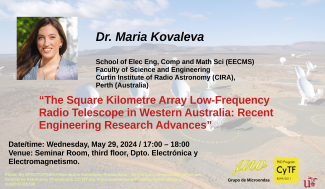Charla del programa de doctorado de CyTF
Fecha
El próximo miércoles 29 de mayo, dentro de las actividades de formación del programa de doctorado en Ciencias y Tecnologías Físicas, tendrá lugar la siguiente charla:
The Square Kilometre Array Low-Frequency Radio Telescope in Western Australia: Recent Engineering Research Advances.
Dr. Maria Kovaleva (Lecturer)
School of Elec Eng, Comp and Math Sci (EECMS)
Faculty of Science and Engineering
Curtin Institute of Radio Astronomy (CIRA) Perth, Australia
Date/time: May 29, 2024 / 17:00 – 18:00
Venue: Seminar Room, Dept. Electronics & Electromagnetism, Physics Faculty Building, Third floor.
Abstract: The Square Kilometre Array (SKA) project is an international project to build the world’s largest radio astronomy observatory. It will consist of the low-frequency component called SKA-Low in Australia and the mid-frequency component called SKA-Mid in South Africa. The construction of SKA-Low radio telescope that will be built in Murchison Radio-astronomy Observatory started in early 2022. SKA-Low will consist of 131,072 antennas designed to operate in the 50-350 MHz frequency band. The antennas will be grouped in the total of 512 arrays, called stations, each consisting of 256 antennas. At Curtin node of International Centre for Radio Astronomy Research, the work on prototype arrays named Aperture Array Verification Systems (AAVS) was undertaken prior to the construction. Extensive computational electromagnetic simulations and measurements, as well as daily all-sky observations were performed to verify the redicted performance of the SKA-Low. This
presentation will provide an update about the engineering research progress of the SKA-Low and present recently developed technique of mutual coupling analysis.
Bio: Maria Kovaleva received the B.S. degree (Hons.) in electrical engineering from the Moscow Technical University of Communications and Informatics, Russia, in 2011, and thePh.D. degree in electronics engineering from Macquarie University, Sydney, Australia, in 2019.She was a 2022 Fulbright Visiting Scholar at the Brigham Young University in Utah, USA, a Postdoctoral Research Associate at Macquarie University and a Lecturer at the University of Sydney. From 2011 to 2014, she was an Antenna Design Engineer with JSC NIIKP (Russian
Space Systems), Moscow, Russia. She is a Lecturer with the Curtin Institute of Radio Astronomy at Curtin University, Australia. Her current research interests include phased array receiving antennas, radio interferometry, polarimetry, evolutionary optimization methods, AI and ML in electromagnetics, and electromagnetic education. She was awarded the Macquarie University Vice-Chancellor’s commendation for academic excellence for her Ph.D. thesis. Maria has been a recipient of various national and international awards







